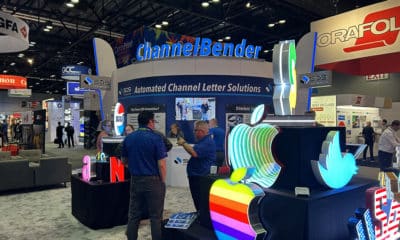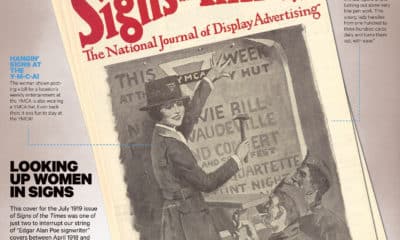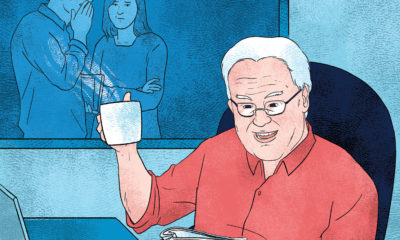
Substituted Substrate Comes Back to Haunt Sign Company
A pandemic decision revealed in “The Case of the Substrate Switcheroo.”
Published
7 months agoon
A JANITORIAL SERVICES cart accident had cracked the lobby sign of Four Your Eyes — FY Eyes for short — an eyecare professional customer of Slayton Signs in Richmond, VA. Because she had other business in the area, Slayton Signs CEO and owner Rebecca Slayton joined the service call in progress both to survey the damage to the sign and to check in with the owner of FY Eyes. When she arrived, her installers were hastily removing it.
“Hang on,” Rebecca said. “Let’s see the damage.” The installers paused — and paused again. Then Mike, the lead installer for the team said, “OK, sure…”
ABOUT REAL DEAL
Real Deal scenarios are inspired by true stories, but are changed to sharpen the dilemmas involved and should not be confused with real people or places. Responses are peer-sourced opinions and are NOT a substitute for professional legal advice. Please contact your attorney if you any questions about an employee or customer situation in your own business.
ABOUT THE AUTHOR
Created by ROLF L’MAO, Signs of the Times’ mascot. Email him at editor@signsofthetimes.com.
Illustrations by Karina Marga Cuizon
Rebecca moved closer to the sign, took a look then moved closer still. The crack looked strange, like something not usually seen with acrylic, which is what this sign was or was supposed to be made of. Rebecca looked at Mike who was now looking down, to the side, anywhere but at her.
“Mike,” Rebecca said. “What’s going on?”
Mike looked up at her. “Oh, you mean the crack?”
“Yes, the crack but also the kind of crack it is, what it looks like,” she said. “What material this is.”
“Yeah.” Mike looked around again then said in a low voice, “Do you mind if we talk about this back at the shop, boss?” Rebecca nodded but her expression of consternation remained.
“Hey, Rebecca!” Everyone heard a woman’s voice from behind and turned around to see Amy Nottingham, owner of Four Your Eyes, standing aside the reception desk.
“Amy!” Rebecca said, and with one more backward glance at Mike and his team, walked over to meet Amy and to visit in her office. “It’s so good to see you again,” Rebecca said as they rounded the corner.
Hours later, Rebecca assembled everyone who had been involved with the eyecare lobby sign in the company conference room.
“Why wasn’t the sign for FY Eye’s lobby acrylic?” Rebecca asked. “And what exactly was it?”
A few heads rotated somewhat innocently and Toni, the project manager said, “I have no idea why it isn’t or wasn’t acrylic.”
After a few more long seconds, Devin from fabrication finally spoke up: “It’s Sintra.”
“Sintra?” Rebecca asked. “Why not acrylic as spec’d?”
“We handled that project in the spring of ’22,” Devin started. “That was when we couldn’t find acrylic anywhere…” His voice trailed off.
“So, we subbed in Sintra and didn’t adjust the quote or invoice?”
“No,” Devin nodded. “I mean yes, we didn’t adjust. That job had been held up pretty long already and the client was hounding Toni about it…”
“Well, obviously, as well intended as this substrate substitution might have been, it was something that shouldn’t have happened, pandemic supply chain problems or not,” Rebecca said. “I mean, we can’t sell a customer on one thing and deliver another. We’re not an airline!”
Everyone around the conference table nodded and some muttered “yes, definitely” or words to that effect. Team members started getting out of their seats.
“Tell me this was the only project we pulled this switcheroo on,” Rebecca said hopefully. Everyone stopped, as if playing “Freeze” when they were kids.
“Oh no,” Rebecca said, aghast. “How many?”
My thanks to Russell Toynes, Studio Dzo (Austin, TX) for this idea. — Rolf L’Mao
AdvertisementThe Big Questions
- What would you do if you were Rebecca? Take action against any employees? Replace any signs made out of spec? Or chalk it up to the pandemic, stop the practice and sit tight?
Dan W.
Tucson, AZ
Replace the current sign, free of charge, with acrylic. Review any others made that way, and make a list. Slowly begin replacing them all, southern exposures first. If questioned by the customers, say the original material was recalled for material defects. Don’t admit the mistake unless you have to, and never let it happen again. Remind your employees that any change to a customer order must be cleared with the customer, and you, including price changes.
Sue M.
Lake Havasu City, AZ
This is a tough one. I would talk to the customers and let them know what happened. Offer to re-do the sign or refund the cost difference. Whichever they wanted. I would make sure my employees never did anything like that again.
Tim S.
Holland, MI
Reprimand the employee and discuss the importance of being honest and how this can affect long-term relationships with clients. Replace the sign with the correct material at no cost. Stop the practice of switching materials to a lower-value material.
Sharon T.
Lakewood, CA
I would contact the clients to tell them that the substitution had been necessary due to the pandemic but with staff sometimes absent, the project team made what they thought was the best decision for the client, but the information did not make it up the chain to me. Now aware, I would offer them compensation for the substitution.
I would offer a choice: an extended warranty on the existing sign plus a modest discount coupon, a much larger discount on their next project, or a smaller immediate cash payment representing the wholesale price difference. If the current sign failed within the original warranty period, it would be replaced with an acrylic sign. I’m having a hard time imagining how a Sintra sign could be mistaken for an acrylic sign, even by an amateur! I would not punish the staff or badmouth them to the client. Blame it on the pandemic, since that obviously was the core reason anyway. Anyone who paid attention and went through that period will understand.
Kevin O.
Dallas
I’d be more concerned as to why it fell to begin with and find out if the janitorial service’s insurance will pay, then remake the sign as it was supposed to have been made now that sourcing is easier, salvaging as much material as possible. But context is important. Getting the sign out the door, up on a wall and invoices paid was paramount for financial and customer service reasons during the pandemic, especially if the client was calling, so I can’t blame the switcheroo in order to please the client’s deadline. Hell, it was hard enough just to get into buildings, let alone find businesses whose doors were still open. But the fact remains, on the client side, most of them don’t care to know what it’s made of — just that it looks right. On the sign company side, everyone in the shop should’ve been aware of the switcheroo and reviewed its usage.
Inam U.
Multan, Pakistan
Will improve SOPs, either compensate or replace sign free of cost.
Ray Z.
Golden Valley, MN
No action against employees, but definitely a stern meeting to establish why this can’t happen again and alternative solutions to similar issues in the future. If this happened, it’s partially because there was no firmly established policy beforehand. Replace any signs made out of spec? Oh, hell no. Water under the bridge at this point. It would be useful to know what substitutions were made and where, but going back to those jobs now is opening a whole can of worms that could spiral out of control easily. Or chalk it up to the pandemic, stop the practice and sit tight? Yep. Uncomfortable a solution as this is, it’s the only reasonable option now.
Tracey K.
Attention Getters Design, El Cajon, CA
I would address this with all employees and check on every job this was done. Then we would come up with some options: 1. Let the client know what happened and why, and offer them a partial refund/credit now that you are fully aware of the situation. 2. Offer them the option to remake the sign on the correct substrate for free. 3. Offer them a huge discount when/if they reorder the sign on the correct material. 4. Finally, establish a new policy with everyone’s input about how to handle this type of situation in the future and why our company stands behind all we do with transparency — never substituting substrates without the client’s knowledge.
Tyler D.
Baltimore
No action would be taken against any employee but there would be emphasis on being on the same page. The practice of substituting Sintra for acrylic would be halted. More than likely would check the signs that are hung and if all are “OK,” nobody would need to be wiser.
AdvertisementRolf L'mao is Signs of the Times' mascot. Contact Rolf at editor@signsofthetimes.com

SPONSORED VIDEO
Introducing the Sign Industry Podcast
The Sign Industry Podcast is a platform for every sign person out there — from the old-timers who bent neon and hand-lettered boats to those venturing into new technologies — we want to get their stories out for everyone to hear. Come join us and listen to stories, learn tricks or techniques, and get insights of what’s to come. We are the world’s second oldest profession. The folks who started the world’s oldest profession needed a sign.
You may like

What Makes the Perfect Sign Business Partnership

Marketing Signs to Schools, Tradeshow and Quote Follow-up Make May’s List

Church Sign Found After Being Stolen From Cemetery
Subscribe

Bulletins
Get the most important news and business ideas from Signs of the Times magazine's news bulletin.
Most Popular
-

 Photo Gallery1 week ago
Photo Gallery1 week ago30 Snapshots of the 2024 ISA Sign Expo
-

 Ask Signs of the Times2 weeks ago
Ask Signs of the Times2 weeks agoWhy Are Signs from Canva so Overloaded and Similar?
-

 Paula Fargo1 week ago
Paula Fargo1 week ago5 Reasons to Sell a Sign Company Plus 6 Options
-

 Real Deal4 days ago
Real Deal4 days agoA Woman Sign Company Owner Confronts a Sexist Wholesaler
-

 Photo Gallery1 week ago
Photo Gallery1 week ago21 Larry Albright Plasma Globes, Crackle Tubes and More
-

 Women in Signs2 weeks ago
Women in Signs2 weeks ago2024 Women in Signs: Brandi Pulliam Blanton
-

 Women in Signs1 week ago
Women in Signs1 week ago2024 Women in Signs: Alicia Brothers
-

 Signs of the Times1 week ago
Signs of the Times1 week agoJuly 1919 Signs of the Times Cover Features Woman Installer









